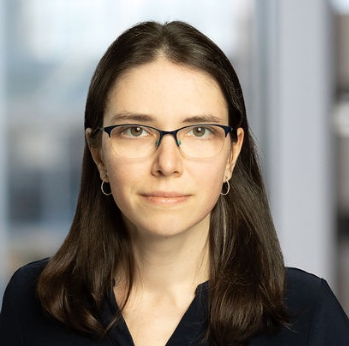Nicole Aretz joined the Oden Institute in September 2021 as a Peter O'Donnell, Jr. Postdoctoral Fellow in Karen Willcox’s research group. Aretz is originally from a town near Aachen, Germany. Her interest in math was present from a young age, which led her to pursue a degree in mathematics.
“Mathematics was always my favorite subject in school,” she said. “When I was looking at what to study for my bachelors, I considered interdisciplinary fields like biochemistry and nanotechnology. But I was always comparing the courses based on how much mathematics was taught in them. At some point, someone asked me why I didn't just study mathematics, and that idea immediately felt right to me.”
During her master's studies at RWTH Aachen University in Germany, Aretz took a seminar on model order reduction where she met her master’s thesis supervisor, Martin Grepl, and her PhD supervisor, Karen Veroy. Collaborating with both professors, Aretz wrote her master's thesis on a reduced basis approximation method for 3D-VAR data assimilation. Soon after, Aretz accepted a PhD position in Veroy's group at the Aachen Institute for Advanced Study in Computational Engineering Science (AICES) where she expanded her work to sensor selection methods for uncertainty quantification. Within AICES, Aretz transitioned to the newly opened International Research Training Group "Modern Inverse Problems" (IRTG MIP). The IRTG collaborated closely with the Oden Institute, which allowed Aretz to interact and work with its faculty and researchers before officially joining later on.
“There are twelve professors at the IRTG MIP and the idea is that every PhD student has one supervisor in Aachen and one at the Oden Institute,” explained Aretz. “My supervisor at the Oden Institute was Tan Bui-Thanh. I came to visit and work with Bui-Thanh for 6 months in 2019, just before the pandemic hit.”
During this visit, Aretz had the opportunity to learn more about Karen Willcox and her research group. Aretz had first met Willcox when she organized Willcox's talk at the 2019 Charlemagne Distinguished Lecture Series (CDLS) at AICES and was impressed by how quickly Willcox would understand topics in the discussion groups and link them to other areas of her expertise. During her visit to the Oden Institute in 2019, Aretz grew even more interested in not only the work being done by the Willcox Research Group, but also in having Willcox as her supervisor.
After submitting her PhD thesis, Aretz joined the Oden Institute as a research fellow with the Willcox Research Group in fall 2021. She has been working on operator inference, which is a scientific machine learning approach that blends data-driven learning with non-intrusive physics-based reduced order modeling.
“The general operator inference approach requires a lot of data for stability. So, depending on what kind of equation we are approximating, we need a lot of additional regularization. What I'm trying to do is, instead of using just standard regularization, I want to take the theory of what we are actually approximating, take properties of the intrusive reduced order model, and include them in this inversion approach.”
Aretz was drawn to the field of computational engineering because of her interest in developing methods. “From the mathematical side, I like doing the theory,” she said. “I like understanding how something works, or why something does not work and finding solutions for that.”
“There are some really cool applications in computational science and engineering, like simulations of the heart and blood flows, or aerospace modeling, or geophysical applications,” Aretz said, adding, “I'm not an expert in any of these fields, but I could be an expert in identifying problems that are common across different applications and finding mathematical solutions.”
Aretz has a particular interest in one day working on a medical application. “During my bachelor's and master’s, I took courses that were a mix between medical engineering and medical mathematics, like artificial organs or how to set up clinical trials,” she explained. “I also used to teach first aid, so I would really be interested one day in having a medical application.”
One of Aretz’s most proud moments is the result of her mentoring a master’s student back at Aachen. “I had been asked for some topics to give to master students, and one student selected one of them for her thesis.,” explained Aretz. “I've been meeting with her a couple times a month to check her progress and the idea actually worked. Now she's asking so many questions because she's interested in what's happening and why. A lot of her questions are questions that I asked myself way back and now I can help answer them. She’s finishing the final computations and I'm just so proud of her,” said Aretz.
Outside of her research, Aretz enjoys a variety of games. She often finds herself at the Emerald Tavern where she likes to play board games and drink coffee with her friends. Aretz is also part of the Austin Chess Club. “I’ve really come to love Austin,” Aretz said, adding, “Most of the people have moved here fairly recently, so it's really easy to connect with them because everybody knows the feeling of coming to a new place. I like getting to talk with people and see where they come from and what their story is.”
